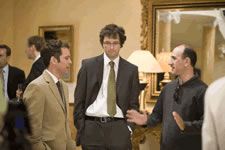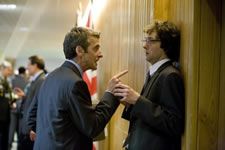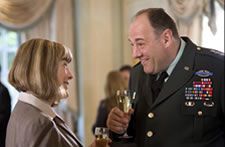
Armando Iannucci, right, with Tom Hollander and Chris Addison onset
It's February 2009, a grim grey day in Glasgow where there are still traces of snow on the ground, but Armando Iannucci is rubbing his hands, clearly pleased to be here. He's an energetic, excitable guy at ease in the comfortable spaces of the hotel where we meet, a stone's throw from the GFT and the heart of the Glasgow Film Festival. With him are actors Peter Capaldi and Chris Addison. They're here to discuss their new film, which has 'hit' written all over it. As Armando settles into his seat, one of my fellow journalists, a taciturn guy in a brown leather jacket, asks him how he feels about bringing In The Loop back to the city where he spent his childhood.
Armando smiles broadly. "I'm very excited. I think it's delightful. I love the GFT. I went to St Aloysius' just round the corner. We used to go to the GFT. It would show things like seasons of Shakespearean films and my English class would go there. I remember sneaking out of a maths class because Felicity Kendall was in a one to one interview. There were five of us. We got out of Maths saying it was for English, but really we just wanted to sit in the front row and stare at Felicity Kendall.
"Being here means we can get family and friends over and take them along to a première. I've never been to a première, so I'm quite looking forward to this Glasgow première."
Peter, also a native of Glasgow, raises his hand. "Do you want a GFT story from me? I remember when it used to called the Cosmo. And I can remember seeing Dumbo there. I don't mean the elephant, I mean the film. I'm quite pleased to be here because it means I get to see my mother and I get to see my sister, for free."
"This is going to be called the The Thick Of It movie, so why didn't you just make that movie?" another journalist asks.
Armando shrugs. "I don't mind people associating it with In The Thick Of It, but I don't want people thinking they've got to have seen that to enjoy the film. The only real character who comes across from The Thick Of It is Malcolm."
Malcolm is Peter's character, a Downing Street enforcer with a nice line in inventive invective. So would Armando still consider the film to be related to The Thick Of It?
 |
"As long as you've got the world fixed in your head and you know the character, you can start pulling out a bit and seeing what's there. Then there's the story of the war and how the Brits were sucked in to feeling a little bit important, getting really giddy about going over to Washington and therefore forgetting what it was they went there to do - that struck me as a funny story. So it was taking those two elements, really, and that then gave the film that international dimension, a bigger canvas for us to work on.
"In The Thick Of It we never see the Prime Minister, so in this one we never see the President. Also I think it becomes more real and more believable if you see the people who are really there doing the day to day stuff, rather than the big people who get to go around in motorcades. They get a bit giddy when they go in motorcades.
"When we were filming the motorcade in the film, we were using Dick Cheney's outriders, and we kept stopping at traffic lights and then going again, and I was thinking that I had to get a shot where that didn't happen, so the gut came over and asked if I wanted them to put their bells and sirens on so we could ride straight through. And that's what we did. And it was great, but I kept thinking that we mustn't get carried away because that's exactly what happened to the characters.
"Going back to The Thick Of It, that's set in the Department for Social Affairs, so it's all about internal, domestic things, and because this was an international story, that dictated that it would be set in International Development, and therefore it took us away from the world of The Thick Of It and those characters and we had to introduce a new minister and a new department."
Attitudes to American politics have changed dramatically since Barack Obama's election. Does that mean it's a bad time to bring out this film?
 |
"But also there is that sense - and this why I deliberately kept it away from being about Iraq and made it more contemporary - there was that sense that it could happen again. Because it's not about evil, nasty people, it's about slightly fragile people making the wrong decisions or not quite having the courage of their convictions. Already we're getting Hilary Clinton being pushy about Iran and Obama talking about a surge in Afghanistan, and the Middle Eastern situation, with Israel, is all very uncertain. I think it's quite important that we see how these things happen. It's not just about one person pushing a button."
Regarding the international scope of the film, one thing that people are complimenting it on is the way it handles different types of humour - British humour, American humour, and so on. I ask how Armando approached this.
"I cast it the way I always cast things," he says, "which was to get people who are happy to work to our method. We'll ask them to read the script and then we'll ask them to improvise around it. And also I looked for people not just from an acting background but younger American actors and people from a comedy stand-up and improv background"
Chris, who has been sitting at the back looking rather shy, interjects. "Zack Woods, who fantastically plays Chad in it, is kind of the equivalent of Ollie in The Thick Of It, so Toby in the film. Ironically we're from very similar backgrounds in improv and stand-up."
"Yes," says Armando. "And whereas James Gandolfini has a film drama background and Chris had a drama background in film as well, Mimi Kennedy is from a sitcom background. She's more well known in the 'States as the mother in Dharma And Greg. And then they all spent time working together, and they were pretty awesome."
Chris smiles. "There's this one occasion I can remember when there was a scene between Jack Woods' character Chad and Anna Clumsky's character Liza where he's just goading her at the foreign office and the shot is set up so that we were all looking down this kind of balcony, and the scene itself took twenty or thirty minutes to film, probably in a single take, and it was relentless back and forth. He is particular was just astonishing. I though, is there no end to this? They were amazing."
"Quite a lot of Chad and Liza's lines came from doing a very, very long take," Armando explains. "Eventually they'd get inspiration and then they just went for each other. When she said 'You're an only child,' and he said 'Don't have a go at my parents' situation, I'm the sperm that made it,' I just thought, where did that come from? Similarly, James and Mimi did a lot of work together and worked out what their relationship was and how they'd interacted as characters together over the years, and then stuff came out at the end."
 |
"Ironically, all working the cameras and sound..." says Armando, laughing.
So were all these talented people competing with each other?
"I think we were all learning about it as we went," says Peter. "I don't think any of us had done that sort of improvisation before. When I had done it it had tended to be with someone just down from Oxbridge who would say, 'I want to do a play,' and I'd say 'What's my part?' and they'd say 'Well, I don't know, we're going to improvise the parts.' And you'd improvise for three weeks and then the person with the biggest ego would get the biggest part. So I'd always kept away from it. But this is quite different, being a character within the dynamic of a story that's very well worked out, so you know what has to happen. I think the hardest thing to do is to listen. Really listen to other people and figure out what they're saying, what the motivation is behind what they're saying, and the story."
Chris nods. "Almost every single take you say 'Respond to what you hear'."
"Also sometimes it is far funnier, on screen seeing someone just go "What?" than seeing them coming back with a really funny line," puts in Armando. "I remember Anna told me that it took her a day or so to realise that it wasn't her job to try and top Chad, but to take it and just look angry and scared."
"That's the thing," Chris agrees. "Your instinct is 'must be good', and that isn't necessarily what your character's supposed to be doing at that time."
"Sometimes in the edits I found that I was taking out lines because they were funny," Armando continues. "Because I felt that, under those circumstances, that character wouldn't say something like that. They wouldn't have the wherewithal to come up with something so elaborate. The funny line suddenly makes you aware of the artifice, and that's not what you want, you want the rawness, the reality."
"Also, I think that people being serious can sometimes be quite funny," Peter adds.
Chris agrees. "Also, we discovered really early on with the television series that you can have too much fun. Peter bollocked us. He went ballistic, and quite rightly, actually. It was very early on and we hadn't quite learned what we were doing."
"It was about staying scared of Malcolm," Peter explains.
"It was exactly that," says Chris. "We weren't staying scared of Malcolm because we'd just had lunch and everyone was getting on really well, we were all really enjoying ourselves, and it wouldn't have worked in any way whatsoever because we were responding to each other as those other people and not in character."
"There are certain things I can't play," says Peter. "I can't make you scared of me. The other actor has to play scared. If they start playing and they're not scared then it's not scary."
Armando nods. "I always thought that with teachers. Very often the teacher who gives out the least punishment is the scary teacher. It's just a look. At school there'd be an empty class, no teacher there., everybody was having fun. One teacher would come in and everyone would just throw things. Another teacher, very rarely, would just put his head in and things would go really quiet. It's a terrible artificial thing, isn't it? There's nothing substantial there behind it, it's just that kind of impression they project of what they might do."
Peter nods. "Like tell you off for going to see Felicity Kendall."
When everyone has finished laughing, Chris recovers his train of thought. "Obviously Malcolm is not a particularly subtle man when it comes to scaring people. Even though both the film and The Thick Of It are fundamentally critical of spin, yet Malcolm is the most irresistibly charismatic character. I know it's almost like a contradiction really, it's entirely the wrong moral centre..."
"Malcolm gets wonderful dialogue and, or course, he hold the keys to the real power. And he's black-hearted," Peter says with a hint of glee.
"Also he can turn on the charm when he wants to," notes Armando. "Not in a romantic way, but in a charismatic way. He very rarely shouts as such."
I ask Peter how he made himself angry enough to play Malcolm.
"As things go along, you get into a sort of groove," he says. "I'm not sure it's right to do that, but you become better equipped at doing things that were more difficult for you to begin with. So I think we were constantly trying to stretch it a little more, and make situations more difficult for Malcolm, get him out of his depth, which we don't normally see. We wanted to make him confront people who are tougher than him. I just sort of pace up and down and try to get some aggro and bile going. A lot of it is about energy and a lot of it is about quite precise actorly kinds of things because the dialogue, although we did a lot of improvisation, was based on fantastic scripts. I really had to learn those lines and physically be able to articulate them so that they could be heard with a certain velocity. I tried to keep myself in a state of tenseness."
"When he dresses and his suit is on, we do start to feel that Malcolm's around," says Armando.
Peter nods. "It's a sort of conjuring trick. I remember the day I went to audition for the role, and I was really pissed off that day. I'd just gone to meet people about a little part in a sitcom and I'd already worked with everybody on that show except the producers, so I thought, why are they dragging me down here to read this not very good piece of script? And then afterwards I went to meet Armando, so obviously I was carrying that anger."
"Is it frustrating when you can't swear that magnificently in real life?" asks one of the younger journalists present.
The others laugh, but Peter agrees. "It's a constant distress to me because I can't - not just swear - I can't speak, I can't construct a sentence properly, I can't reach the end of a sentence effectively at all, whereas the writers provided me with fantastic lines. So, that's what I worry about. His mind is fast, and a bit of my mind is fast, but not the bit with words."
At this point the first journalist decides it's time to take the conversation back to Armando, asking what would qualify, for him, as success in the US.
"I don't think it's going to be like Star Wars or anything like that," Armando says. "It's had good word of mouth. The Sundance screening has given it a lot of buzz, so if we can persuade enough people that, don't worry, I know it's all about politics, but it's not about politics, it's more about people really, then hopefully we can get a good number of people in. I have no idea really. I think that, in terms of British comedy transferring to the 'States, the notion that this will do fantastically may be unrealistic."
Is it too subtle for a market which prefers broad comedy?
"Not so far. But also, when you peel back all the layers of politics and intrigue, it's very consciously modelled on a screwball comedy. People kind of like that. When we were playing at Sundance, the feedback we were getting was 'this is like a screwball comedy'. Which were very fast. I think people like that. I'm not saying it's a mass market mainstream thing - I think it will have a select audience, and my ambition for it is to find that audience. I think if you start planning more than that it's very unrealistic."
So what are his plans if he is successful?
"I want to go on and do another film. I've always wanted to do funny films. I've just been waiting for the right opportunity and the right story. So I'm very pleased that it's come together for this one. We are going to do another series of The Thick Of It later in the year, but I know that films take longer than that to get going and I want to start thinking ahead to the next one."





















